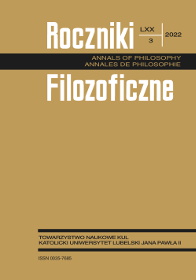Czy możliwe jest ufundowanie teorii etycznej na emocji podziwu?
Is It Possible to Found a Moral Theory on the Emotion of Admiration?
Author(s): Natasza SzuttaSubject(s): Philosophy, Ethics / Practical Philosophy
Published by: Towarzystwo Naukowe KUL & Katolicki Uniwersytet Lubelski Jana Pawła II
Keywords: exemplarist moral theory; exemplar; moral emotions; admiration; Zagzebski
Summary/Abstract: The article focuses on the exemplarism of Linda Zagzebski (2017). Zagzebski proposes to found an ethical theory on the emotion of admiration. In the first explanatory part, I present the central assumptions of exemplarism. I explain what constitutes a moral exemplar; the role admiration plays in Zagzebski’s theory; and the unique nature of her approach. In the second, critical part, I highlight the strong and weak sides of exemplarist ethical theory. I refer to the rich empirical data that confirms the importance of modeling in moral education as well as the role of positive emotions in moral development. I underline the practical dimension of Zagzebski’s approach. The weakness of exemplarism lies in its overly strong emphasis on admiration as the foundation of moral theory. This is the case for the following two reasons. Firstly, the kind of admiration that Zagzebski has in mind is difficult to define and distinguish from other similar emotions that do not deserve to be regarded as foundational for an ethical theory. Secondly, it seems that it is not admiration that comes first, followed by the moral values that we discover through this emotion, but rather that admiration is secondary, constituting a response to the values that we already recognize as admirable.
Journal: Roczniki Filozoficzne
- Issue Year: 70/2022
- Issue No: 3
- Page Range: 9-33
- Page Count: 25
- Language: Polish

